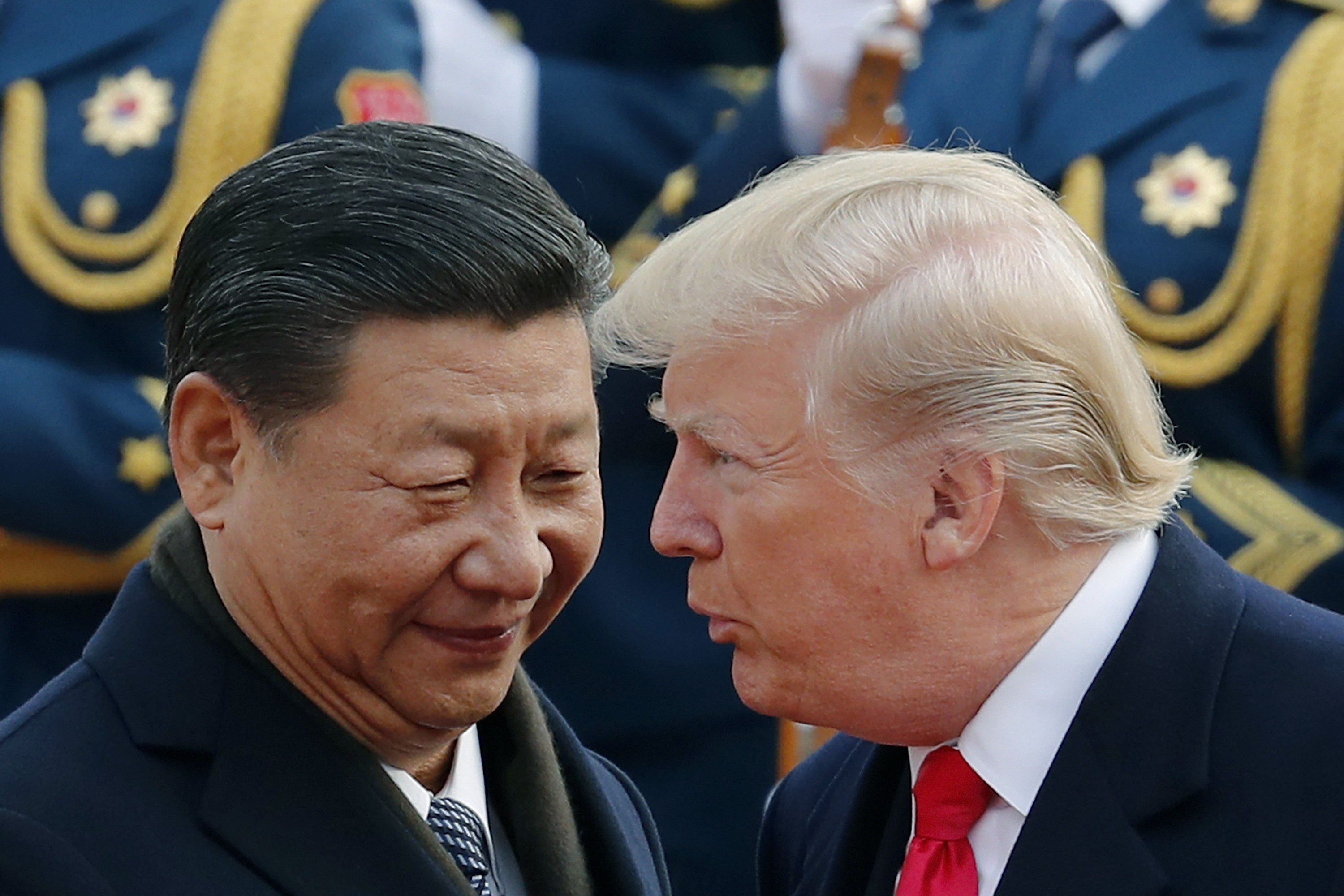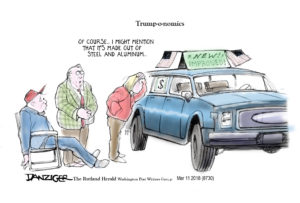Could Washington’s Impeachment Drama Spark China Trade Deal?
A deal with Beijing would allow Trump to claim a needed victory and divert attention from an explosive congressional investigation. Chinese President Xi Jinping and Donald Trump in Beijing in 2017. (Andy Wong / AP)
Chinese President Xi Jinping and Donald Trump in Beijing in 2017. (Andy Wong / AP)
WASHINGTON — The Democratic impeachment inquiry may do at least one thing for President Donald Trump: It could give him more incentive to resolve his trade war with China.
As the political heat rises in Washington, a deal with Beijing would allow Trump to claim a much-needed victory and divert some attention from an explosive congressional investigation into his dealings with Ukraine.
Analysts say Trump’s conflict with Beijing, which has shaken financial markets and further darkened the global economic outlook, could be headed for some tentative resolution in the coming months. Talks between the two countries are set to resume in October.
“The political mess may now encourage President Trump to accept an imperfect deal with China,” Hussein Sayed of the foreign exchange brokerage FXTM wrote in a report. “After all, he needs to prove that he’s the master of deal-making, and now is the right time to raise his approval rating higher.”
At the same time, however, the impeachment inquiry may have dimmed the prospects for other items on Trump’s trade agenda, including his push for congressional approval of a revamped North American trade agreement. That would require backing from the Democratic-led House, and relations between the two parties may now be more inflamed than ever.
The impeachment proceedings will likely dominate Washington for months, siphoning time and energy from the normal business of government — debating, compromising, legislating, policymaking. The likelihood of meaningful legislative gains was already slight. Now, it appears even more remote.
White House Press Secretary Stephanie Grisham went so far as to assert that the House Democrats’ investigation “destroyed any chances of legislative progress for the people of this country.”
By contrast, a tentative resolution in Trump’s China trade war wouldn’t need congressional approval, one reason for some renewed optimism.
The world’s two biggest economies are engaged in the biggest trade war since the 1930s. The Trump administration alleges that Beijing deploys predatory tactics — including stealing technology and forcing foreign companies to hand over trade secrets — in its drive to surpass America’s technological supremacy.
Trump has imposed tariffs on more than $360 billion in Chinese imports and is set to raise the taxes on most of them next month. He plans to tax an additional $160 billion in Chinese goods Dec. 15 — thereby extending his tariffs to just about everything China ships to the United States. Beijing has retaliated by taxing $120 billion in U.S. imports.
The U.S. business community is eager for an end to the exchange of tariffs, which has raised costs and created uncertainty about where to situate factories, hire suppliers and sell products.
Even before members of Congress began pursuing an impeachment investigation, Chinese leaders were speculating Trump might want a deal to bolster his political standing, said Willy Lam, a politics specialist at the Chinese University of Hong Kong.
“Even though the likelihood of impeachment going through is low, the Chinese will think they hold some kind of advantage over the U.S., and Trump might tend to be more conciliatory given his domestic troubles,” said Lam. “He needs a triumph overseas to burnish his position.”
President Xi Jinping also might want at least a temporary agreement to strengthen his own political position as China’s ruling Communist Party’s Central Committee heads into a key meeting in October.
“Xi Jinping is anxious to have something to show the Central Committee members on the Sino-U.S. front,” Lam said.
It isn’t clear what Beijing might be willing to offer as a compromise. Lam said one possibility might be improved protection of foreign patents and copyrights, although Beijing in the past has resisted U.S. demands to write such commitments into law.
This week, Trump himself suggested that some sort of trade pact with China “could happen sooner than you think,” repeating his oft-stated assertion that Chinese leaders “want to make a deal very badly.”
Congress is meantime considering whether to ratify one of the Trump administration’s signature achievements: a pact reached last year with Canada and Mexico to replace the 25-year-old North American Free Trade Agreement.
Trump’s trade representative, Robert Lighthizer, has been trying to address congressional Democrats’ complaints. Those include criticism that the US-Mexico-Canada agreement wouldn’t sufficiently protect American workers who must compete with lower-wage Mexican laborers.
Lighthizer is among the few Trump administration officials who enjoy good relations with House Democrats, and the two sides have stressed that they are working in good faith to address their differences over the agreement, known as the USMCA.
“Lighthizer has worked long and hard to keep it out of the realm of conflict over the broader Trump agenda,” said Rufus Yerxa, president of the National Foreign Trade Council and a former U.S. trade official.
But the impeachment proceedings threaten to poison the atmosphere. Sen. Chuck Grassley of Iowa, the Republican chairman of the Finance Committee, urged Democrats not to “use impeachment proceedings as a basis to not act on policy that will directly benefit Americans like the USMCA.”
Daniel Ujczo, a trade lawyer at Dickinson Wright PLLC in Columbus, Ohio, suggested that heightened partisanship has probably torpedoed any hope of a grand bargain in which, say, the administration agrees to some gun-control measures in return for the Democrats approving the USMCA.
“I don’t think USMCA is dead for 2019,” he said. “But it’s definitely on life support.”
Still, Ujczo said, “I don’t see anybody giving up on ratification” — though it likely will spill over into 2020. Lawmakers face intense pressure from business and farm groups eager to have the pact take effect and end uncertainty over U.S. trade with Canada and Mexico, which last year amounted to $1.4 trillion.
Asked whether the impeachment inquiry will keep Congress from approving USMCA, the Mexican undersecretary for foreign trade, Luz Maria de la Mora, told reporters Wednesday: “No. We really think the USMCA is in its own track and other issues are domestic political issues …. We feel that there is good support for USMCA.”
Even during the Watergate investigation into President Richard Nixon, Yerxa recalled, Congress managed to make progress on what became a major piece of legislation, the Trade Act of 1974.
Yerxa also said he thought that impeachment proceedings could weaken Trump politically and embolden Congress to reassert control over trade policy. The Constitution gives Congress authority over trade. But lawmakers over the years have yielded their power to the White House, allowing the president, for example, to tax imports that the Commerce Department declares to be a threat to national security.
Trump has used the authority aggressively. He has imposed tariffs on foreign steel and aluminum and threatened to tax auto imports, too. Sens. Pat Toomey, R-Penn., and Mark Warner, D-Va., have introduced legislation to restrain the president’s ability to tax imports on national security grounds.
“Things like that are going to gain steam,” Yerxa said. “People in Congress are going to be looking for ways of reestablishing congressional control.”
___
McDonald reported from Beijing. AP Writer Luis Alonso Lugo in Washington contributed to this report.
Your support matters…Independent journalism is under threat and overshadowed by heavily funded mainstream media.
You can help level the playing field. Become a member.
Your tax-deductible contribution keeps us digging beneath the headlines to give you thought-provoking, investigative reporting and analysis that unearths what's really happening- without compromise.
Give today to support our courageous, independent journalists.

You need to be a supporter to comment.
There are currently no responses to this article.
Be the first to respond.